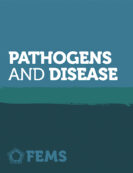FEMS Microbiology Letters Poster Prize: Amaru Indigo Miranda San Martin Djurhuus
Microbial Food and Feed Ingredients (MIFFI2018)
The first International Conference on Microbial Food and Feed Ingredients (MIFFI2018) took place on 2-4 May 2018, in Copenhagen, Denmark.
The MIFFI 2018 Conference encompassed various topics in this research area: microbial food cultures for the dairy, meat, and wine industry; probiotic cultures for food and dietary supplements; direct fed microbials for feed; yeast and yeast extracts; proteins and peptide ingredients produced by fermentation; and, metabolites produced by fermentation used as ingredients in food and feed (e.g. vitamins, acids, alcohols, and flavors). We have also published a Thematic Issue of papers from research presented at this conference.
FEMS Microbiology Letters awarded a Poster Prize to Amaru Indigo Miranda San Martin Djurhuus at the conference. Read an interview with Amaru below.
Amaru Indigo Miranda San Martin Djurhuus
What is your current position, and what was your scientific journey to get there?
I am a student at the University of Copenhagen (Denmark), finishing my MSc in Biology in the Microbiology program. I am currently working on my master’s thesis, due September this year, which I am conducting at Aarhus University, Roskilde (Denmark) in the Department of Environmental Science, under professor Lars Hestbjerg Hansen at the Environmental Microbial Genomics group.
Quite early on in my studies, during the introductory courses on my BSc in Biology, I became fascinated by bacteriophages and I quickly got involved in several projects on the subject. I was very lucky to be able to learn more about the nature of bacteriophages and get an introduction to the academic world, while working on some short projects in the laboratories of Mathias Middelboe (University of Copenhagen) and Sine Lo Svenningsen (University of Copenhagen). These experiences primed me to do research within this very rewarding field.”
Could you describe the research your poster covered?
My research is part of the project “PhytoProtect” spearheaded by Lars Hestbjerg Hansen and Alexander Byth Carstens. Our aim is to establish a biobank of bacteriophages (phages) targeting several agriculturally important plant pathogens, in order to apply them as a green alternative to conventional pesticides.
This work focused on one of the potential applications of phage biocontrol: to control disease caused by soft rot Enterobacteriaceae (Dickeya and Pectobacterium genera) during the storage of potato tubers. Soft rot is an economically important disease of potato with no effective ways of control available.
We seek to develop an approach, which can be easily incorporated into the potato production pipeline. To this end, we characterized our biobank of 80 phages and selected six of them to be included in a phage cocktail. We then set up a proof-of-principle experiment, where we treated the potato tubers with our phage cocktail prior to inoculation with the soft rot pathogen Dickeya solani.
We were able to significantly reduce the incidence of disease by 44% (Chi-squared test, P<0.001) via phage treatment. Furthermore, the severity of disease in infections occurring after treatment was also significantly reduced, lowering the amount of macerated potato tissue about four-fold (Mann-Whitney U test, P<0.001).
These preliminary results, illustrate the potential of phage technologies in agriculture, which can be applied post-harvest providing interesting solutions to widespread problems.”
What do you hope to focus your research on in the future?
The field of phage therapy, and other phage technologies in general, has been revitalized in the face of widespread problems with antibiotic resistance. Understanding the interactions between phages and bacteria more thoroughly is vital when developing safer and more efficient methods for health- and agriculture-based phage applications. I hope to be able to focus on some of these aspects moving forward.”
All but one of the FEMS journals are now fully open access (OA), with one journal, FEMS Microbiology Letters remaining a subscription journal with free-to-publish and OA options. Open access is key to supporting the FEMS mission of disseminating high quality research as widely as possible: when high quality, peer reviewed sound science is open access, anyone, anywhere in the world with an internet connection, can read it.








